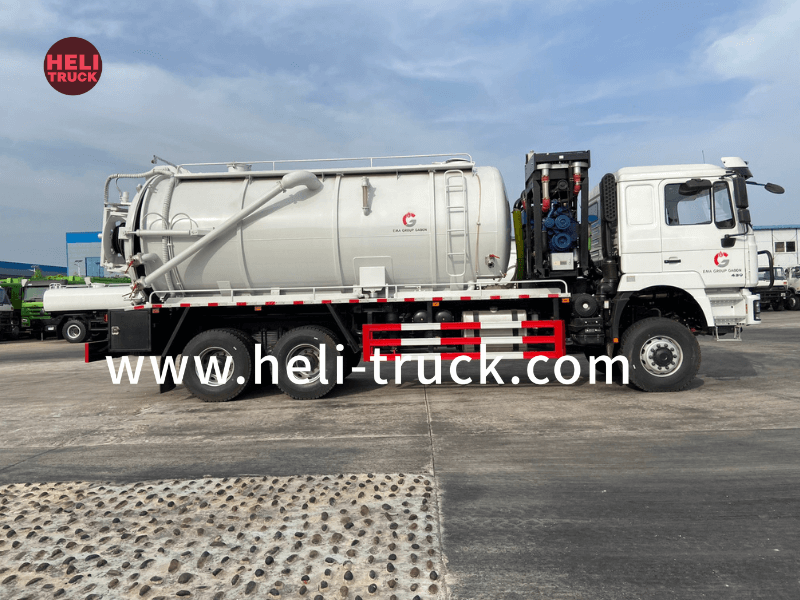Introduction:
Garbage compactor trucks play a crucial role in waste management systems worldwide. These specialized vehicles are designed to collect and compact solid waste efficiently, reducing the volume of garbage and maximizing the space utilization in landfills. One key factor that distinguishes garbage compactor trucks is their compaction force, which determines the effectiveness of waste compression. In this article, we will delve into the world of garbage compactor trucks with high compaction force, exploring their features, benefits, and impact on waste management practices.
Understanding Garbage Compactor Trucks:
Garbage compactor trucks, also known as compactors or trash compactors, are essential tools in the waste management industry. These vehicles are equipped with a hydraulic compactor system that compresses solid waste, such as household trash, commercial waste, and industrial debris, into a more compact form. By reducing the volume of waste, compactor trucks can transport larger quantities of garbage in each trip, minimizing the number of trips required for waste collection and disposal.
The compaction force of a garbage compactor truck refers to the pressure exerted on the waste material during the compaction process. Trucks with high compaction force are capable of achieving greater compression ratios, resulting in denser and more tightly packed loads of garbage. This not only increases the efficiency of waste collection and transportation but also reduces the environmental footprint of waste disposal by maximizing landfill capacity.
Features of Garbage Compactor Trucks with High Compaction Force:
Garbage compactor trucks with high compaction force are equipped with a range of features that enhance their performance and efficiency. Some of the key features include:
1. Powerful Hydraulic System: High-compaction trucks are equipped with robust hydraulic systems that generate significant pressure to compress waste effectively. The hydraulic cylinders apply force to the waste material, compacting it into a dense block for storage and transportation.
2. Large Loading Capacity: Trucks with high compaction force often have larger loading capacities, allowing them to collect and compact larger volumes of waste in a single cycle. This reduces the frequency of trips to the landfill, saving time and fuel costs for waste management operations.
3. Automatic Compaction Control: Many modern garbage compactor trucks are equipped with automatic compaction control systems that adjust the compaction force based on the type and volume of waste being processed. This feature ensures optimal compression levels and prevents overloading of the compactor unit.

4. Sealed and Leak-Proof Design: To prevent odors and leakage of waste fluids during transportation, high-compaction trucks are designed with sealed compartments and leak-proof containers. This helps maintain a clean and sanitary environment during waste collection and disposal activities.
Benefits of Garbage Compactor Truck s with High Compaction Force:
The use of garbage compactor trucks with high compaction force offers numerous benefits to waste management operations, municipalities, and the environment. Some of the key benefits include:
1. Increased Efficiency: High-compaction trucks can process larger volumes of waste in less time, improving the efficiency of waste collection and transportation services. This leads to cost savings and enhanced productivity for waste management companies.
2. Reduced Environmental Impact: By compressing waste into denser loads, compactor trucks with high compaction force help maximize landfill capacity and extend the lifespan of disposal sites. This reduces the need for additional landfills and minimizes the environmental impact of waste disposal.
3. Improved Health and Safety: The sealed design of high-compaction trucks helps contain odors, prevent littering, and reduce the risk of exposure to hazardous waste materials. This contributes to a cleaner and safer working environment for waste management personnel and the community at large.
4. Cost Savings: High-compaction trucks can carry more waste per load, reducing the number of trips required for waste collection and disposal. This results in lower fuel consumption, reduced maintenance costs, and overall savings for waste management operations.
Impact of High Compaction Force Trucks on Waste Management Practices:
The adoption of garbage compactor trucks with high compaction force has had a significant impact on waste management practices worldwide. These specialized vehicles have revolutionized the efficiency and effectiveness of waste collection and disposal services, leading to several positive outcomes:
1. Streamlined Operations: High-compaction trucks enable waste management companies to streamline their operations by reducing the time and resources required for waste collection, transportation, and disposal. This allows for more efficient allocation of manpower and equipment, improving overall service delivery.
2. Sustainable Waste Management: By maximizing the compaction of waste materials, high-compaction trucks contribute to sustainable waste management practices. The reduced volume of waste lowers the carbon footprint of waste disposal and promotes resource conservation by optimizing landfill space.
3. Enhanced Public Health: Proper waste management is essential for maintaining public health and sanitation standards. Garbage compactor trucks with high compaction force help contain and manage waste efficiently, reducing the risk of disease transmission, pollution, and environmental contamination.
4. Compliance with Regulations: Many jurisdictions have strict regulations governing waste management and disposal practices. Garbage compactor trucks with high compaction force enable waste management companies to comply with these regulations by ensuring safe and proper handling of waste materials.
Conclusion:
Garbage compactor trucks with high compaction force are indispensable tools in modern waste management systems. These specialized vehicles offer numerous benefits, including increased efficiency, reduced environmental impact, improved health and safety, and cost savings. By compressing waste into denser loads, high-compaction trucks help optimize landfill space, promote sustainable waste management practices, and enhance overall service delivery. As the demand for effective waste management solutions continues to grow, the importance of garbage compactor trucks with high compaction force cannot be overstated in shaping a cleaner, greener future for our communities.
